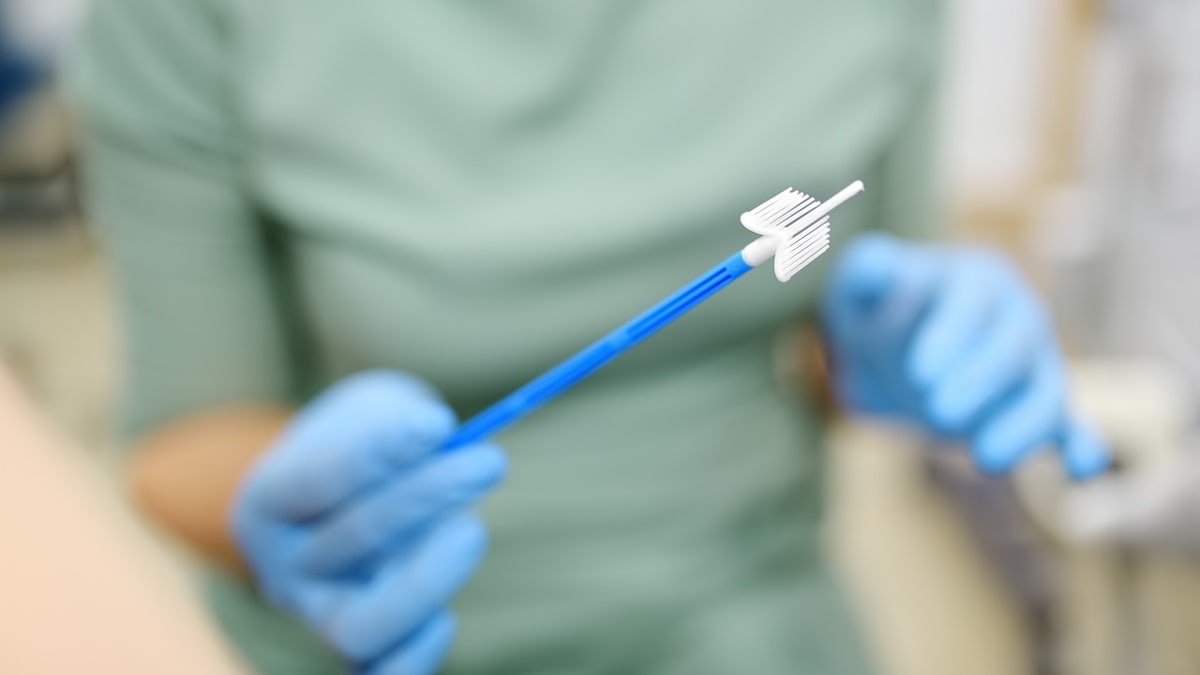The Food and Drug Administration (FDA) has approved the first at-home screening test for cervical cancer, the product’s maker announced on Friday.
The DIY test could serve as an alternative to in-person “Pap smears,” which are recommended every three years for women up to age 65.
The self-collection device — the Teal Wand, made by Teal Health in San Francisco — allows women to procure a sample and mail it in for laboratory analysis.
NEW CERVICAL CANCER TREATMENT APPROACH COULD REDUCE RISK OF DEATH BY 40%, TRIAL RESULTS SHOW
The test is designed to detect human papillomavirus (HPV), the virus that causes almost all cervical cancer cases.

The Food and Drug Administration has approved the first at-home screening test for cervical cancer, the product’s maker announced on Friday. (iStock)
The approval comes after a clinical trial including more than 600 women, in which the Teal Wand had a 96% accuracy rate of detecting cervical precancers.
In the study, 86% of participants said they’d be more likely to comply with cervical cancer screening recommendations if they could do it at home, Teal Health reported.
Additionally, 94% said they would prefer to self-collect at home as long as the results were accurate.
CERVICAL CANCER DEATHS COULD BE REDUCED WITH HOME HPV TESTING, STUDY FINDS
“Cervical cancer is largely preventable, yet screening rates in the U.S. continue to lag, and the FDA approval of this at-home Teal Wand self-collection device is a critical step forward,” said Dr. Christine Conageski, associate professor, OB-GYN and director of the Complex Dysplasia Clinic at the University of Colorado, who was a principal investigator in the SELF-CERV trial.
“It offers an evidence-based way to expand access without compromising accuracy,” she added in a statement.

“Cervical cancer is largely preventable, yet screening rates in the U.S. continue to lag, and the FDA approval of this at-home Teal Wand self-collection device is a critical step forward,” a doctor said. (iStock)
Approximately 11,500 new cervical cancer diagnoses are made in the U.S. each year, and the disease causes 4,000 annual deaths, according to the Centers for Disease Control and Prevention.
In addition to the cervical cancer risk, some higher-risk incidences of HPV can also cause other types of cancers, according to experts.
“Any type of test that helps detect cervical cancer is a win.”
Women between the ages of 25 and 65 who are at average risk of cervical cancer will soon be able to order the at-home test at www.getteal.com, according to the company’s announcement.
Kits are expected to first become available in California starting in June, with plans to expand across the country “as soon as possible,” the company said in its announcement.
CLICK HERE TO SIGN UP FOR OUR HEALTH NEWSLETTER
“Teal is working with major insurance providers and plans to have flexible payment options, helping to remove financial concerns and ensuring more women have access to this preferred at-home screening if they want it,” the company stated.

Approximately 11,500 new cervical cancer diagnoses are made in the U.S. each year, and the disease causes 4,000 annual deaths. (iStock)
In addition to the collection kit, the product also includes a telehealth service with support from medical providers throughout the process.
Women who test positive for HPV will be referred for a traditional Pap smear. Those who do not test positive are not considered at risk of cervical cancer and will not need to screen again for three to five years.
CLICK HERE TO GET THE FOX NEWS APP
“Some women are scared of a traditional Pap smear or find the process uncomfortable — as a result, they put off this vital test,” said Ami Vaidya M.D., co-chief of gynecologic oncology at Hackensack University Medical Center’s John Theurer Cancer Center, in a press release. (She was not involved in the trial.)
For more Health articles, visit www.foxnews.com/health
“This could be an important tool in getting more women regularly screened, especially those who don’t have access to a medical provider. Any type of test that helps detect cervical cancer is a win.”








